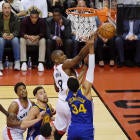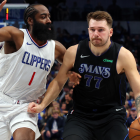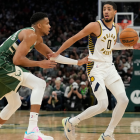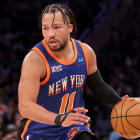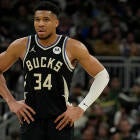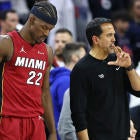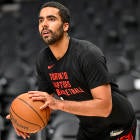TORONTO – From the moment the Toronto Raptors traded for Kawhi Leonard last summer, the potential of them becoming an elite defense was always quite obvious. This is what happens when you add perhaps the best perimeter defender on planet Earth to a group that had the NBA's fifth-best defense a year ago.
It took time. The first four months of the regular season – up until Feb. 8 – the Raptors' defense ranked eighth in the NBA. It was good, but it would never be confused with being great, as being ranked below the Miami Heat and Memphis Grizzlies, two sub-.500 teams, would indicate. But Feb. 8 was the day that Masai Ujiri made one more gutsy, defense-focused trade in acquiring Marc Gasol at the deadline. At that point, the potential of this Raptors defense became even more clear: A long, athletic, tough, versatile group, led by two former defensive players of the year.
After that point, the Raptors defense leaped from good to great, ranking third in the NBA the rest of the regular season. But as Kawhi reminded us back in early spring, those 82 games of the regular season were just practice for the games that matter. And since the games that matter have begun, the Raptors' defense has been one of the best defenses in recent memory.
Since the playoffs began, the Raptors have posted a 102.9 defensive rating over 19 games. That is a full two points per 100 possessions better than the NBA's top-ranked defense during the regular season. The last team to post a better defensive rating than that over an entire regular season was the San Antonio Spurs in 2016-17.
How have they done it? It's a surprisingly simple big-picture strategy, and it was exemplified by the Raptors' win over the Golden State Warriors on Thursday night in Game 1 of the NBA Finals.
The top goal of the Raptors is to keep their opponents out of transition – especially when their opponents have been elite transition teams like the Philadelphia 76ers, the Milwaukee Bucks and the Golden State Warriors. They've accomplished that largely by focusing on not turning the ball over – the Raptors committed only 10 turnovers on Thursday night – and by being judicious about crashing the offensive glass. If you crash the glass recklessly, Nurse has emphasized to his team, that means not being able to get back to play transition defense. The Warriors managed only 17 fast-break points against the Raptors on Thursday night.
And then, when the Raptors are able to contain you to the halfcourt, they absolutely choke you out. Their half-court defense has been a thing of beauty during these playoffs: Bodies flying everywhere, but always in concert with each other. Kawhi has been the best version of Kawhi for much of these playoffs, but the Raptors at their best aren't a Kawhi solo show; they're a symphony, with Kawhi as the featured soloist, Gasol as the conductor and the rest of the supporting cast all physically connected to each other's minds. Warriors head coach Steve Kerr compared the Raptors defense to the Warriors' own defense when it is at its best: Long, athletic, versatile, switchy.
It was a question going into this series whether Gasol is fleet afoot enough to get out and guard the Warriors in space. After one game, that question seems silly.
"His IQ is really high, he knows how to get out there, and he's shown over the last few games, or maybe more than that, that he's pretty good when he gets a mismatch on a shooter," Raptors head coach Nick Nurse said Thursday night. "He went up in the last series and guarded Middleton really well, and when there would be a breakdown, he would end out way out on the floor on those guys. And I thought he did a decent job on some of those guys tonight. Just really good reactions."
While the Warriors' halfcourt offense gained some steam in the second half – it was a three-point game with 10 minutes left – at no point did it ever feel like the Raptors relinquished control. The Warriors never went on one of those patented, dizzying Warriors runs. The most jarring statistic is this one: In the half-court, the Warriors – the NBA's best offense during the regular season, with two of the greatest shooters in history – scored 83.9 points per 100 possessions. For those who aren't analytically minded, allow me to interpret that statistic: That is absolute trash offense by the Warriors.
Or, more accurately, it's absolutely bonkers defense by the Raptors. Especially by the steady Fred VanVleet. According to Second Spectrum, VanVleet guarded Curry on 29 possessions. During those possessions, Curry scored two points.
This is what the best version of the Raptors looks like. It's not Kawhi Leonard having to be a superhero. It's Kawhi being the tough and brilliant Kawhi while his supporting cast steps up. They bottled up the Warriors on the defensive end. And on the other end, the Warriors defense didn't play nearly as tight of a game as the Raptors.
"Kawhi didn't have his best game to his standards but other guys stepped up," Klay Thompson said afterward. "So we'll have to get back on defense next game and really limit their transition points, make them beat us in the half court. Yeah, we did a good job of limiting Kawhi, but it's not Kawhi Leonard. It's the Raptors."
From the Warriors' standpoint, they were pretty sanguine about their Game 1 loss. Thompson said their goal from the outset was to steal one out of two in Toronto; they still have Sunday night's Game 2 to go, so that goal is still within reach. The Warriors kept pointing out after the game that they didn't know this version of the Raptors team; they only played twice this season, and not once with Steph Curry and Kawhi Leonard on the floor at the same time. Now they have tape to go back and study.
"Their defense was great and it wasn't our best night," Kerr said. "We just got outplayed. Simple as that. Move on to the next one."
Simple as that. But if the Raptors continue to play this elite-level defense, nothing is going to be too simple this series for the reigning champs.













